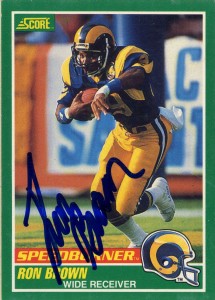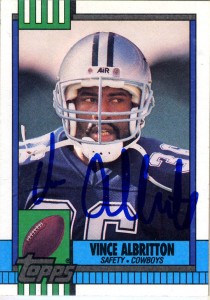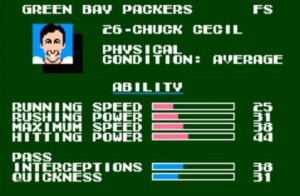Card: Score 1989 Speedburner
Acquired: In Person 1990, Dallas Cowboys Training Camp
Al Davis loves himself some speed and this is always evident in the fleet wide receivers he signs. A prime example was Plan B signee Ron Brown from the then across town Los Angeles Rams. A world class speedster that won the gold medal in the Olympics as part of a 4×100 relay that set the record with Carl Lewis, Ron would also finish fourth in the 100 meters.
Originally drafted by the Cleveland Browns, Brown ended up on the Rams in 1984, basically replacing speedster Drew Hill. He worked primarily at receiver until the following year when his skills were applied at kick returning,- a position he’d excel at averaging an incredible 32.8 yards per return and 3 touchdowns. He’d tie an NFL record with 2 kick off returns for touchdowns against Green Bay. Ron was named All Pro that season and to the Pro Bowl following the season in 1985. He continued to see success primarily as a returner from there on for the rest of his time, and had a career high 521 yards receiving in 1987. He’d retire momentarily again in 1988 to train for the Olympics, but quickly returned to the Rams that season. Over his career he’d be an all purpose man for the Rams finishing with a bit over 5800 yards from scrimmage. He’d play one season with Al Davis and the Raiders, where they tried to convert his speed to defensive back, but again returned to the Rams in 1991, retiring at the age of 30.
G/Gs 100/32 Rec 98 Yds 1791 Avg 18.3 Td 13 Lg 65 |
Rt 199 Yds 4439 Avg 22.6 Td 4 Lg 89T



 In his career, Cecil made one ProBowl while with the Packers and was a favorite of the All Madden Team. He was also recognizable for his oversized ‘Gazoo’ helmet he wore to protect against further concussions. Despite his reputation as a hard hitting free safety, Chuck did more damage to himself, sustaining bloody noses and concussions on a regular basis, all for forcing 1 fumble in 445 tackles. A 2009 College Football Hall of Fame inductee, Chuck’s 100 yard interception return was voted the greatest Wildcat play of all time.
In his career, Cecil made one ProBowl while with the Packers and was a favorite of the All Madden Team. He was also recognizable for his oversized ‘Gazoo’ helmet he wore to protect against further concussions. Despite his reputation as a hard hitting free safety, Chuck did more damage to himself, sustaining bloody noses and concussions on a regular basis, all for forcing 1 fumble in 445 tackles. A 2009 College Football Hall of Fame inductee, Chuck’s 100 yard interception return was voted the greatest Wildcat play of all time.